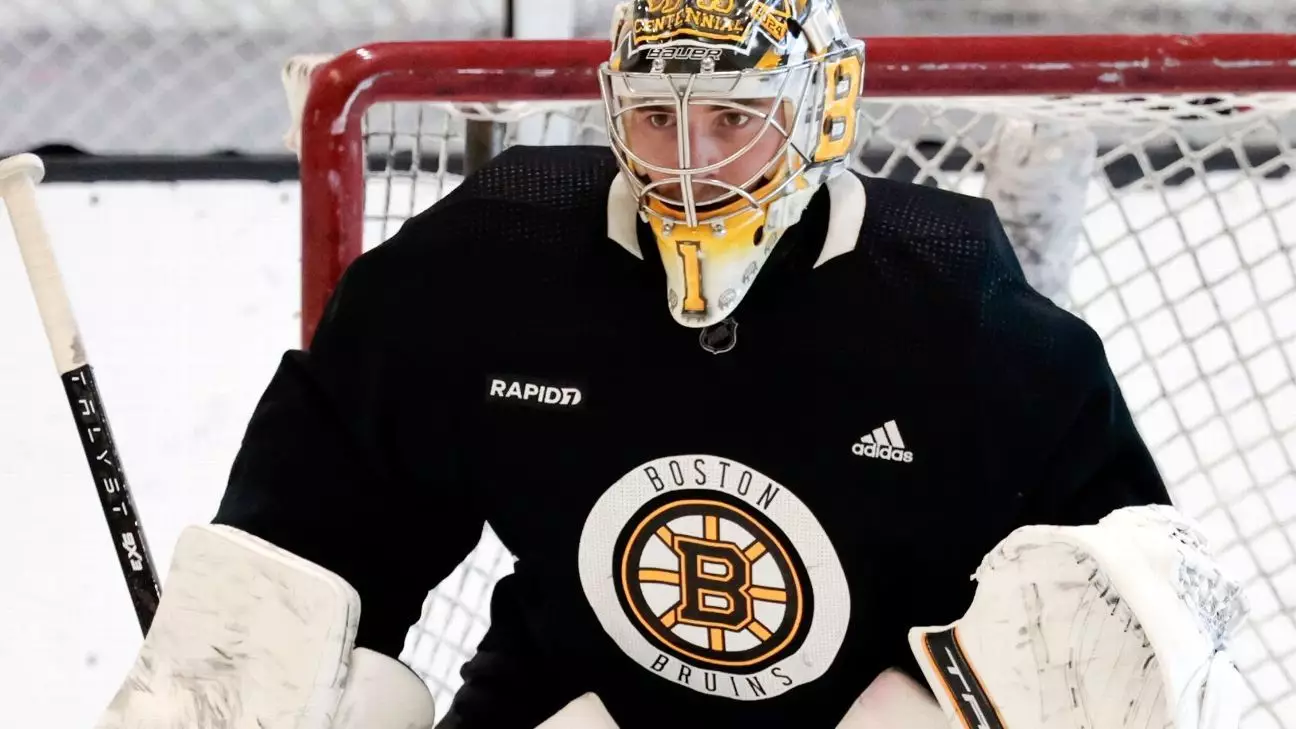The tension-filled negotiation saga between the Boston Bruins and their young goaltender Jeremy Swayman reached a boiling point earlier this week. The friction escalated when Swayman’s agent, Lewis Gross, publicly contested the Bruins’ claims about the contract terms offered to his client. As the Bruins gear up for the new season and are heading into their training camp, Swayman’s absence looms large, casting a shadow over the team’s goaltending plans.
By choosing not to attend training camp until a new contract is finalized, Swayman is sending a strong message about his value to the team. At only 25 years old, he has demonstrated considerable proficiency as an NHL goaltender. His decision is particularly impactful given that the Bruins traded away Linus Ullmark during the offseason, making Swayman the presumptive starting goaltender. Coach Jim Montgomery indicated that Joonas Korpisalo would likely take the net when the season commences against the Florida Panthers on October 8. However, many fans and analysts alike understand that Swayman’s long-term absence could hinder the Bruins’ performance, especially given his impressive statistics from the last few seasons.
During a press conference on Monday, Bruins president Cam Neely acknowledged his belief that Swayman wishes to play for the franchise. However, he lamented the lack of a completed deal, implying that Swayman’s expectations might be the core of the problem. In a strong rebuttal, agent Lewis Gross claimed that the figures Neely cited during the press conference—specifically the remarkable $64 million figure—were blown out of proportion, stating that it was never mentioned in their negotiations until that moment.
This public back-and-forth raises critical questions about professional conduct in contract negotiations. When agents and teams take issues to the media, it can create distrust and further complicate the already intense dynamics of player contracts. Gross clearly felt the need to protect his client’s image, emphasizing the unfairness of divulging potential offers that had not been formally presented. As Gross suggested, taking negotiations to social media could be viewed as a strategy to rally public support, which convolutes the negotiation processes and can lead to broader misunderstandings.
Another layer to this complex situation is the Bruins’ recent decisions regarding their roster. General Manager Don Sweeney has faced criticism for not securing Swayman’s contract prior to trading Ullmark. Critics argue that this lack of foresight has diminished the team’s negotiating power, particularly when discussions might involve extensive contract commitments.
Sweeney, however, remains steadfast in his assertions that the decisions to trade Ullmark and negotiate Swayman’s contract are independent. He insists that parting ways with Ullmark was necessary given the $64 million committed to the team for this season. With reports that Swayman is pursuing a contract upwards of $9.5 million annually, the general manager’s strategy is outrightly transparent; he is committed to navigating the financial constraints while fielding a competitive roster.
As Swayman enters his fifth season, his statistics imply that he is poised to become one of the NHL’s top goaltenders. With a career record of 79-33-15 and a .919 save percentage, he has proven his worth on the ice. Nevertheless, the pressure from both the team and Swayman’s camp raises the stakes. Establishing a successful partnership hinges on finding common ground.
As the contract negotiations drag on, the Bruins must consider the implications of a prolonged absence for Swayman. If he remains off the ice for substantial time, it could have debilitating effects on his performance once the contract is ultimately settled. Moreover, the psychological strain of being sidelined during a critical phase of his career may cloud his performance when he finally debuts for the upcoming season.
As the deadline looms closer on December 1, the situation becomes even more pressing. Sweeney has expressed optimism that a resolution will materialize before the cutoff, but the recent turn of events suggests that this optimism may be unfounded.
The future of Jeremy Swayman’s relationship with the Boston Bruins rests on the frailty of negotiations. The outcome will undoubtedly be watched closely by fans and analysts alike, not only for its immediate ramifications on the team but for its impact on the landscape of NHL goaltending contracts moving forward. With both sides at an impasse, the coming days will be crucial in deciding whether the promising young goaltender will return to the ice as a Boston Bruin, or if this contract dispute signals the start of a more profound schism between player and franchise.


Leave a Reply